Here's some of the celebrations around the world.
 Young Georgian Orthodox worshippers carry national flags during a religious procession in Tbilisi Sunday, Jan. 7, 2007, to mark Orthodox Christmas. The Georgian Orthodox Church observes Christmas on Jan. 7 because it retained the Julian calendar. (AP Photo/Shakh Aivazov)
Young Georgian Orthodox worshippers carry national flags during a religious procession in Tbilisi Sunday, Jan. 7, 2007, to mark Orthodox Christmas. The Georgian Orthodox Church observes Christmas on Jan. 7 because it retained the Julian calendar. (AP Photo/Shakh Aivazov) Metropolitan Mrdja Nikolaj, head of the Serb Orthodox Church in Bosnia, heads an Orthodox Christmas service in the Bosnian capital of Sarajevo, Sunday, Jan. 7, 2007. Bosnian Serbs, as Orthodox Christians, celebrate Christmas according to the Julian calendar. (AP Photo/Hidajet Delic)
Metropolitan Mrdja Nikolaj, head of the Serb Orthodox Church in Bosnia, heads an Orthodox Christmas service in the Bosnian capital of Sarajevo, Sunday, Jan. 7, 2007. Bosnian Serbs, as Orthodox Christians, celebrate Christmas according to the Julian calendar. (AP Photo/Hidajet Delic) People seen near Moscow's Cathedral of Christ the Savior during an Orthodox Christmas celebration, Sunday, Jan. 7, 2007. The Russian Orthodox Church, like some other Orthodox churches including the one in Serbia, observes Christmas on Jan. 7 because it retained the Julian calendar. (AP Photo/Alexander Zemlianichenko)
People seen near Moscow's Cathedral of Christ the Savior during an Orthodox Christmas celebration, Sunday, Jan. 7, 2007. The Russian Orthodox Church, like some other Orthodox churches including the one in Serbia, observes Christmas on Jan. 7 because it retained the Julian calendar. (AP Photo/Alexander Zemlianichenko) A priest takes communion from Macedonian Christian Orthodox Bishop Gorazd, left, during a holy Christmas liturgy in St. Clement's Cathedral in Macedonia's capital Skopje, Sunday, Jan. 7, 2007. Macedonian Christian Orthodox believers celebrate Christmas by the Julian calendar. (AP Photo/Boris Grdanoski)
A priest takes communion from Macedonian Christian Orthodox Bishop Gorazd, left, during a holy Christmas liturgy in St. Clement's Cathedral in Macedonia's capital Skopje, Sunday, Jan. 7, 2007. Macedonian Christian Orthodox believers celebrate Christmas by the Julian calendar. (AP Photo/Boris Grdanoski) Macedonian Christian Orthodox Archbishop Stefan reads a prayer book during a holy Christmas liturgy in St. Clement's Cathedral in Macedonia's capital Skopje, Sunday, Jan. 7, 2007. Macedonian Christian Orthodox believers celebrate Christmas by the Julian calendar. (AP Photo/Boris Grdanoski)
Macedonian Christian Orthodox Archbishop Stefan reads a prayer book during a holy Christmas liturgy in St. Clement's Cathedral in Macedonia's capital Skopje, Sunday, Jan. 7, 2007. Macedonian Christian Orthodox believers celebrate Christmas by the Julian calendar. (AP Photo/Boris Grdanoski) Police officers assist an elderly woman to visit an orthodox church in Grozny, Chechnya, on Sunday, Jan. 7, 2007, during an Orthodox Christmas celebration. Chechnya, a mainly Muslim region in southern Russia, has been wracked by a separatist conflict between Chechen rebels and Russian troops and their local allies for most of the past dozen years. Although major offensives died down years ago, small groups of rebels still clash with Russian forces. (AP Photo/Kazbek Vakhayev)
Police officers assist an elderly woman to visit an orthodox church in Grozny, Chechnya, on Sunday, Jan. 7, 2007, during an Orthodox Christmas celebration. Chechnya, a mainly Muslim region in southern Russia, has been wracked by a separatist conflict between Chechen rebels and Russian troops and their local allies for most of the past dozen years. Although major offensives died down years ago, small groups of rebels still clash with Russian forces. (AP Photo/Kazbek Vakhayev) A Bosnian Orthodox Serb woman prays on Orthodox Christmas day inside the Saint Trojice church in Banja Luka January 7, 2007. Bosnian Orthodox believers celebrate Christmas by the Julian calendar, which is two weeks behind the Gregorian calendar. REUTERS/Ranko Cukovic (BOSNIA AND HERZEGOVINA)
A Bosnian Orthodox Serb woman prays on Orthodox Christmas day inside the Saint Trojice church in Banja Luka January 7, 2007. Bosnian Orthodox believers celebrate Christmas by the Julian calendar, which is two weeks behind the Gregorian calendar. REUTERS/Ranko Cukovic (BOSNIA AND HERZEGOVINA) Gaza's Greek Orthodox Bishop Alexious gives blessed bread to Palestinian worshippers during the Christmas Mass at Saint Perforius Church in Gaza City, Sunday, Jan. 7, 2007. Many Orthodox Christians, including those in Eastern Europe and the Holy Land, celebrate Christmas on Jan. 7 because of their adherence to the Julian calendar. (AP Photo/Adel Hana)
Gaza's Greek Orthodox Bishop Alexious gives blessed bread to Palestinian worshippers during the Christmas Mass at Saint Perforius Church in Gaza City, Sunday, Jan. 7, 2007. Many Orthodox Christians, including those in Eastern Europe and the Holy Land, celebrate Christmas on Jan. 7 because of their adherence to the Julian calendar. (AP Photo/Adel Hana) Serb girls, who crossed the bridge into the Albanian-dominated south of the ethnically divided Kosovo town of Mitrovica, sing during a service for Orthodox Christmas in the fire-gutted Sveti Sava church January 7, 2007. A United Nations blueprint for the fate of the breakaway province is due within weeks, following a general election in Serbia on January 21. REUTERS/Damir Sagolj (SERBIA)
Serb girls, who crossed the bridge into the Albanian-dominated south of the ethnically divided Kosovo town of Mitrovica, sing during a service for Orthodox Christmas in the fire-gutted Sveti Sava church January 7, 2007. A United Nations blueprint for the fate of the breakaway province is due within weeks, following a general election in Serbia on January 21. REUTERS/Damir Sagolj (SERBIA) Gaza's Greek Orthodox Bishop Alexious gives blessed bread to Palestinian worshippers during the Christmas Mass at Saint Perforius Church in Gaza City, Sunday, Jan. 7, 2007. Many Orthodox Christians, including those in Eastern Europe and the Holy Land, celebrate Christmas on Jan. 7 because of their adherence to the Julian calendar. (AP Photo/Adel Hana)
Gaza's Greek Orthodox Bishop Alexious gives blessed bread to Palestinian worshippers during the Christmas Mass at Saint Perforius Church in Gaza City, Sunday, Jan. 7, 2007. Many Orthodox Christians, including those in Eastern Europe and the Holy Land, celebrate Christmas on Jan. 7 because of their adherence to the Julian calendar. (AP Photo/Adel Hana) Palestinian Greek Orthodox worshippers gather during the Christmas Mass at Saint Perforius Church in Gaza City, Sunday, Jan. 7, 2007. Many Orthodox Christians, including those in Eastern Europe and the Holy Land, celebrate Christmas on Jan. 7 because of their adherence to the Julian calendar. (AP Photo/Adel Hana)
Palestinian Greek Orthodox worshippers gather during the Christmas Mass at Saint Perforius Church in Gaza City, Sunday, Jan. 7, 2007. Many Orthodox Christians, including those in Eastern Europe and the Holy Land, celebrate Christmas on Jan. 7 because of their adherence to the Julian calendar. (AP Photo/Adel Hana) Macedonian Christian Orthodox Archbishop Stefan speaks during a holy Christmas liturgy in St. Clement's Cathedral in Macedonia's capital Skopje, Sunday, Jan. 7, 2007. Macedonian Christian Orthodox believers celebrate Christmas by the Julian calendar. (AP Photo/Boris Grdanoski)
Macedonian Christian Orthodox Archbishop Stefan speaks during a holy Christmas liturgy in St. Clement's Cathedral in Macedonia's capital Skopje, Sunday, Jan. 7, 2007. Macedonian Christian Orthodox believers celebrate Christmas by the Julian calendar. (AP Photo/Boris Grdanoski) Serbian Orthodox Patriarch Pavle (front) and Serbian Prime Minister Vojislav Kostunica pray during Orthodox Christmas liturgy in Belgrade January 7, 2007. Serbian Orthodox believers celebrate Christmas by the Julian calendar which is two weeks behind the Gregorian calendar. REUTERS/Marko Djurica (SERBIA)
Serbian Orthodox Patriarch Pavle (front) and Serbian Prime Minister Vojislav Kostunica pray during Orthodox Christmas liturgy in Belgrade January 7, 2007. Serbian Orthodox believers celebrate Christmas by the Julian calendar which is two weeks behind the Gregorian calendar. REUTERS/Marko Djurica (SERBIA) Patriarch Pavle, the head of the Serbian Orthodox Church performs solemn liturgy on Orthodox Christmas,Sunday, Jan.7, 2007, in Belgrade, Serbia. Orthodox Serbs celebrate Christmas according to Julian calendar. (AP Photo/Srdjan Ilic)
Patriarch Pavle, the head of the Serbian Orthodox Church performs solemn liturgy on Orthodox Christmas,Sunday, Jan.7, 2007, in Belgrade, Serbia. Orthodox Serbs celebrate Christmas according to Julian calendar. (AP Photo/Srdjan Ilic) Palestinian President Mahmoud Abbas (C) attends Orthodox Christmas service at the Church of Nativity in the West Bank city of Bethlehem early January 7, 2007. REUTERS/Loay Abu Haykel (WEST BANK)
Palestinian President Mahmoud Abbas (C) attends Orthodox Christmas service at the Church of Nativity in the West Bank city of Bethlehem early January 7, 2007. REUTERS/Loay Abu Haykel (WEST BANK) Priests take part in an Orthodox Christmas service at the Church of Nativity in the West Bank city of Bethlehem early January 7, 2007. REUTERS/Oleg Popov (WEST BANK)
Priests take part in an Orthodox Christmas service at the Church of Nativity in the West Bank city of Bethlehem early January 7, 2007. REUTERS/Oleg Popov (WEST BANK) A woman making the sign of the cross is reflected in an icon during a Christmas service in the church of an Orthodox female monastery in the Siberian city of Krasnoyarsk early January 7, 2007. Most Orthodox Christians celebrate Christmas according to the Julian calendar on January 7, two weeks after most western Christian churches that abide by the Gregorian calendar. REUTERS/Ilya Naymushin (RUSSIA)
A woman making the sign of the cross is reflected in an icon during a Christmas service in the church of an Orthodox female monastery in the Siberian city of Krasnoyarsk early January 7, 2007. Most Orthodox Christians celebrate Christmas according to the Julian calendar on January 7, two weeks after most western Christian churches that abide by the Gregorian calendar. REUTERS/Ilya Naymushin (RUSSIA) Palestinian President Mahmoud Abbas, left, sits next to the Greek Orthodox Patriarch of Jerusalem Theofilos III, right, as they attend Orthodox Christmas services according to the Eastern calendar at the Church of Nativity in the West Bank city of Bethlehem, early Sunday, Jan. 7, 2007 (AP Photo/Nasser Shiyoukhi)
Palestinian President Mahmoud Abbas, left, sits next to the Greek Orthodox Patriarch of Jerusalem Theofilos III, right, as they attend Orthodox Christmas services according to the Eastern calendar at the Church of Nativity in the West Bank city of Bethlehem, early Sunday, Jan. 7, 2007 (AP Photo/Nasser Shiyoukhi) Greek Orthodox acolytes attend Orthodox Christmas services according to the Eastern calendar at the Church of Nativity in the West Bank city of Bethlehem, early Sunday, Jan. 7, 2007. (AP Photo/Nasser Shiyoukhi)
Greek Orthodox acolytes attend Orthodox Christmas services according to the Eastern calendar at the Church of Nativity in the West Bank city of Bethlehem, early Sunday, Jan. 7, 2007. (AP Photo/Nasser Shiyoukhi) Coptic Orthodox Pope Shenouda III stands during the celebration of the Coptic Christmas Eve at the Cathedral in Cairo late January 6, 2007. Coptic Christians all over the world celebrate Christmas on January 7. REUTERS/Nasser Nuri (EGYPT)
Coptic Orthodox Pope Shenouda III stands during the celebration of the Coptic Christmas Eve at the Cathedral in Cairo late January 6, 2007. Coptic Christians all over the world celebrate Christmas on January 7. REUTERS/Nasser Nuri (EGYPT) Russian Prime Minister Mikhail Fradkov (L) and the Speaker of the State Duma, the lower house of parliament, Boris Gryzlov, attend an Orthodox Christmas service in the Christ the Saviour cathedral in Moscow early January 7, 2007. Most Orthodox Christians celebrate Christmas according to the Julian calendar on January 7, two weeks after most western Christian churches that abide by the Gregorian calendar. REUTERS/Alexander Natruskin (RUSSIA)
Russian Prime Minister Mikhail Fradkov (L) and the Speaker of the State Duma, the lower house of parliament, Boris Gryzlov, attend an Orthodox Christmas service in the Christ the Saviour cathedral in Moscow early January 7, 2007. Most Orthodox Christians celebrate Christmas according to the Julian calendar on January 7, two weeks after most western Christian churches that abide by the Gregorian calendar. REUTERS/Alexander Natruskin (RUSSIA) Greek Orthodox Ecumenical Patriarch Bartholomew leads a group of believers, nuns, and priests into the St. George patriarchal cathedral for the Epiphany day mass in Istanbul January 6, 2007. REUTERS/Fatih Saribas (TURKEY)
Greek Orthodox Ecumenical Patriarch Bartholomew leads a group of believers, nuns, and priests into the St. George patriarchal cathedral for the Epiphany day mass in Istanbul January 6, 2007. REUTERS/Fatih Saribas (TURKEY) Russian Orthodox Patriarch Alexiy II burns incense during a Christmas mass in the Christ the Saviour cathedral in Moscow early January 7, 2007. Most Orthodox Christians celebrate Christmas according to the Julian calendar on January 7, two weeks after most western Christian churches that abide by the Gregorian calendar. REUTERS/Alexander Natruskin (RUSSIA)
Russian Orthodox Patriarch Alexiy II burns incense during a Christmas mass in the Christ the Saviour cathedral in Moscow early January 7, 2007. Most Orthodox Christians celebrate Christmas according to the Julian calendar on January 7, two weeks after most western Christian churches that abide by the Gregorian calendar. REUTERS/Alexander Natruskin (RUSSIA) Russian Orthodox Patriarch Alexiy II burns incense during a Christmas mass in the Christ the Saviour cathedral in Moscow early January 7, 2007. Most Orthodox Christians celebrate Christmas according to the Julian calendar on January 7, two weeks after most western Christian churches that abide by the Gregorian calendar. REUTERS/Alexander Natruskin (RUSSIA)
Russian Orthodox Patriarch Alexiy II burns incense during a Christmas mass in the Christ the Saviour cathedral in Moscow early January 7, 2007. Most Orthodox Christians celebrate Christmas according to the Julian calendar on January 7, two weeks after most western Christian churches that abide by the Gregorian calendar. REUTERS/Alexander Natruskin (RUSSIA)
![[Unam Sanctam]](https://blogger.googleusercontent.com/img/b/R29vZ2xl/AVvXsEiymQ2adTjpZ1ABhPBbBBquiPCxeQrc4Jy_97vOikT0wGQeJleriiXQy6ebnb0jrYe-TfvcK77txStB4aIwVAdD41ZdMkVfNtFGC0JX6LBV9B8mfeRZaIAM7Sj-011ag3DiKQzv/s1600/headerdivinemercy.jpg)











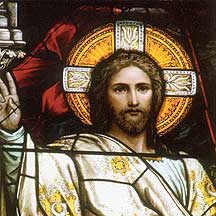







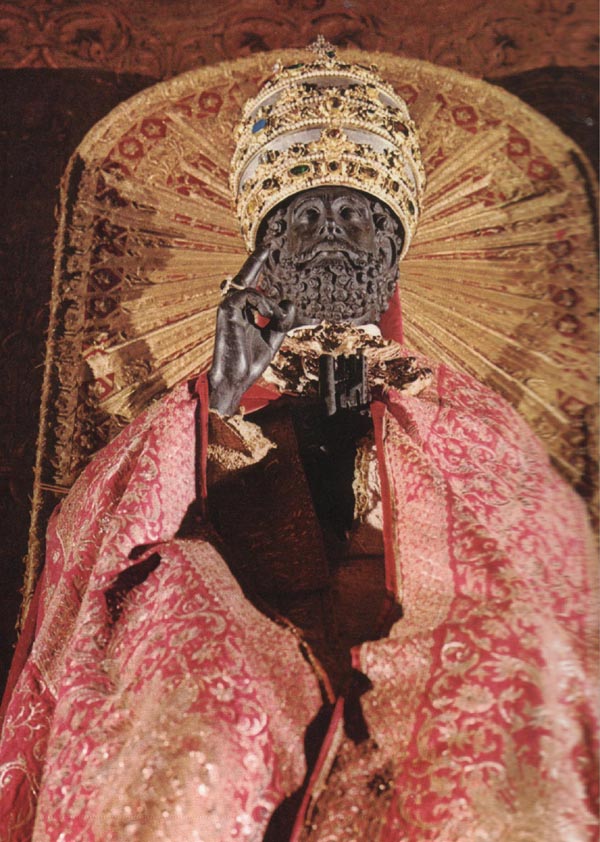
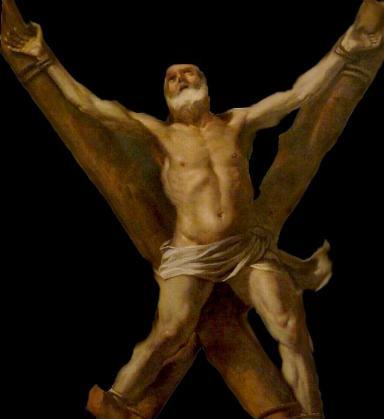




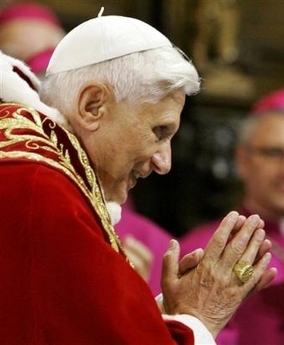






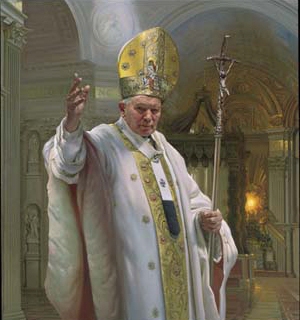
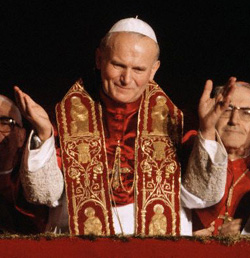
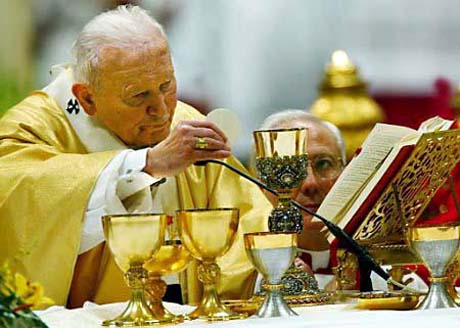







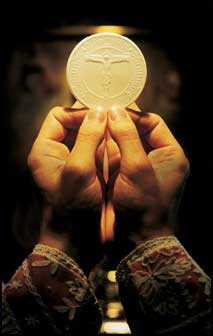
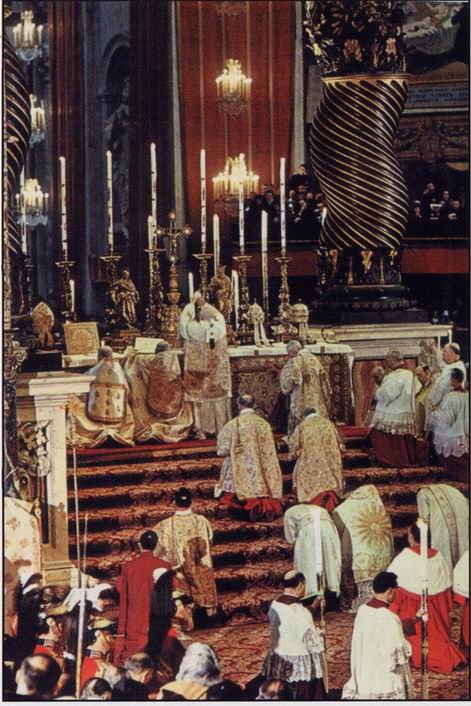

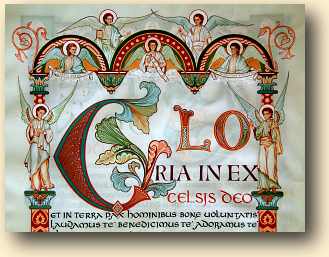

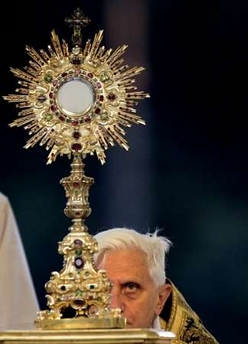


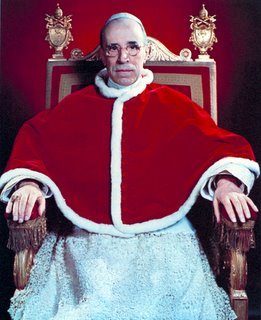




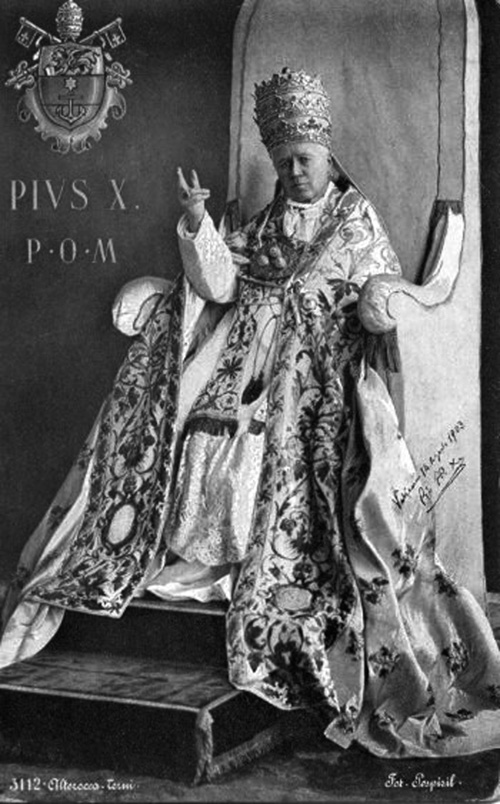



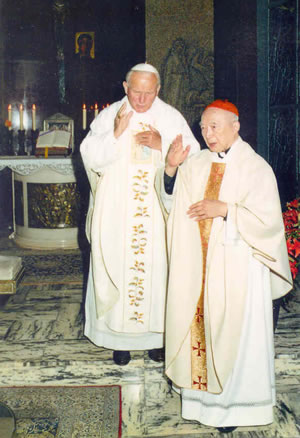





1 comment:
Thanks for those pictures. I'm Orthodox and I really enjoyed seeing the Orthodox Christmas pictures!
Post a Comment